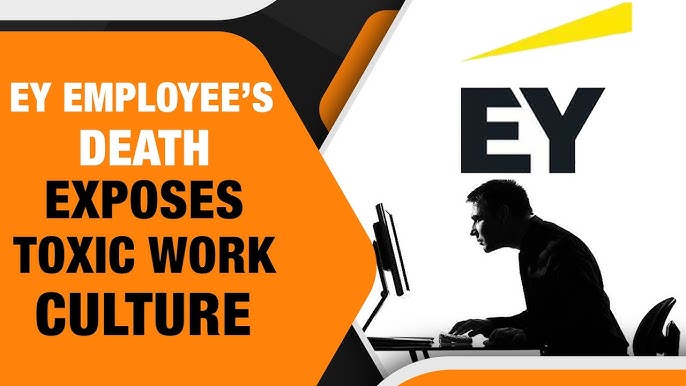
The Toxic Work Culture at Ernst & Young (EY): A Growing Concern
The tragic death of 26-year-old Anna Sebastian Perayil, an Ernst & Young (EY) employee in Pune, has sent shockwaves across the nation. Anna’s sudden demise, which occurred after only four months with the company, has ignited a firestorm of discussions around the toxic work culture prevalent in many top consulting firms. This tragedy is not an isolated incident but part of a growing pattern of exploitation, unhealthy work conditions, and mental health struggles faced by employees at large multinational corporations (MNCs) in India.
A Heartbreaking Story
Anna Sebastian Perayil joined the audit and assurance team at EY in March, and within four short months, her life came to a devastating end. While official causes may be debated, Anna’s mother, Anita Augustine, made it clear in her viral letter that she believed the toxic work culture at EY played a significant role in her daughter’s death. Anita’s words resonated with many who have been silently suffering under similar oppressive working conditions. The public outcry following the release of this letter reflects widespread anger over the exploitative nature of these corporate environments, which prioritize profits over employee well-being.
EY’s Response: The Leaked Email
In the wake of Anna’s death, EY India’s chairman issued an internal email with a “do not forward” directive, attempting to manage the situation behind closed doors. The contents of this email were eventually leaked, drawing further criticism toward the company’s handling of the situation. Rather than showing genuine concern or taking responsibility for the toxic culture, the leaked email appears to demonstrate more concern over maintaining EY’s reputation than addressing the root causes of the problem.
Personal Stories Emerge
Anna’s death has opened the floodgates for former and current EY employees to share their experiences. Many have taken to platforms like LinkedIn to voice their own struggles with the company. The stories paint a harrowing picture of long working hours, a lack of work-life balance, and a general disregard for employee health.
A former EY employee, who is now a freelance content writer, shared her experience. She recalled the excitement of receiving her first job offer from a prestigious Big 4 firm, only to quickly realize that the reality was far from what she had imagined. Within months, she found herself overwhelmed by the demands of the job, which affected her physical and mental well-being. When she made the difficult decision to quit, she was met with criticism, being labeled as “immature” and “incapable of keeping up” with the corporate world. This response is emblematic of a culture that glorifies overwork and stigmatizes those who prioritize their health.
Another individual recounted his wife’s experience with EY, where she was expected to work 18-hour days as if it were the norm. Even during personal milestones like their wedding, she was not given a break. Just two days before their wedding, her manager called her at 10 PM about a timesheet, and despite her approved leave, she was asked to conduct an urgent session. Such stories highlight the relentless pressure placed on employees, who are expected to sacrifice their personal lives for the sake of the company.
The Culture of Overwork and Exploitation
What these stories reveal is that EY, like many large consulting firms, fosters a culture of overwork that has become normalized within the industry. Employees are expected to work excessively long hours, often at the cost of their health and personal lives. This is particularly prevalent in India, where there is a lack of regulatory frameworks to protect workers from exploitation.
While employees at EY may earn salaries ranging from 10 to 25 lakh per year, the company’s top management reaps far greater rewards. CEO and key managerial positions enjoy annual salary hikes of two to three times their already significant earnings, while the employees toiling below them often see little to no increases in their compensation. This glaring disparity creates a toxic environment where workers are undervalued and overburdened.
A close source within the company revealed that certain managerial staff hold a particularly exploitative view of Indian employees. They believe that Indians can be pushed to their limits in the pursuit of money, and therefore, should be kept constantly under pressure. Workers are threatened with the prospect of losing their jobs if they do not meet unreasonable demands, and in a country where layoffs are alarmingly easy, employees have little recourse to protect themselves.
Mental Health: A Casualty of Corporate Greed
The mental health toll on employees working under such conditions cannot be understated. EY employees have repeatedly spoken about how the company’s demands eroded their mental well-being, yet there seems to be little institutional support to address these concerns. Instead, employees are expected to “tough it out,” with mental health struggles often brushed aside as signs of weakness.
This attitude has created a culture where seeking help or admitting vulnerability is seen as a career death sentence. Employees who burn out or struggle to meet the firm’s unrelenting expectations are often cast aside, their health problems dismissed as personal failures rather than a symptom of a toxic work environment.
Anna Sebastian Perayil’s death serves as a tragic reminder of the consequences of this neglect. She, like many others, faced an overwhelming burden, and without adequate support, the weight became too much to bear. The consulting industry, particularly firms like EY, must take a hard look at the systemic issues that lead to such tragic outcomes.
The Myth of Success in the Corporate World
One of the reasons toxic work cultures persist in firms like EY is the myth of success that surrounds them. Many young graduates, fresh out of college, dream of landing a job at a prestigious firm like EY. These companies are seen as gateways to lucrative careers, offering high salaries and the promise of rapid career advancement. But the reality is often starkly different from these dreams.
Once inside, employees quickly find themselves trapped in a cycle of endless work and impossible demands. The dream job becomes a nightmare, as workers are expected to sacrifice their health and personal lives in exchange for a paycheck. This myth of success continues to lure in new talent, perpetuating the cycle of overwork and burnout.
It’s important to challenge this narrative and bring attention to the true cost of working in such environments. Success should not come at the expense of one’s health and well-being, yet firms like EY have built their reputations on a model that glorifies overwork and dismisses the human cost involved.
The Need for Change
The death of Anna Sebastian Perayil has brought the issue of toxic work culture to the forefront, but much more needs to be done to address the systemic problems within firms like EY. Regulatory oversight is sorely lacking in India, where labor laws often fail to protect employees from exploitation. Companies are rarely held accountable for the mental and physical toll they place on their workers, and employees who speak out are often met with retaliation.
It’s time for a shift in how we approach work culture, particularly in industries like consulting. Companies like EY must prioritize the well-being of their employees, providing them with the support and resources they need to maintain a healthy work-life balance. This includes enforcing reasonable working hours, offering mental health support, and addressing the root causes of burnout.
Furthermore, there needs to be greater transparency and fairness in compensation. While top executives continue to receive astronomical salary increases, the workers who form the backbone of the company are left with stagnant wages and unreasonable workloads. This disparity not only fuels resentment but also contributes to the toxic environment that has led to tragedies like Anna’s death.
Time for Accountability
The death of Anna Sebastian Perayil is a wake-up call for the consulting industry and, more broadly, for the corporate world. Her tragic passing has shone a light on the toxic work cultures that are pervasive in firms like EY, where employees are pushed to their limits without adequate support.
It’s time for companies like EY to be held accountable for the working conditions they create. This is not just about addressing one tragic incident but about fundamentally changing the way we view work and success. Employees deserve more than just a paycheck—they deserve to be treated with dignity, respect, and care. Only then can we prevent future tragedies and create a healthier, more equitable work environment for all.





